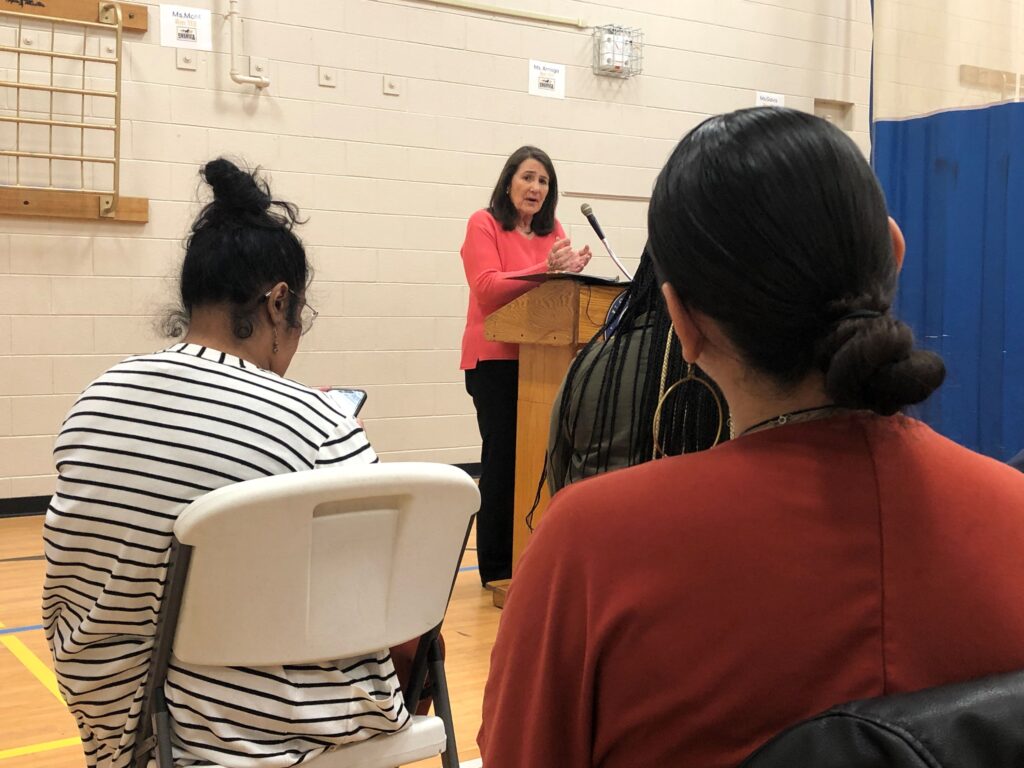By Kathryn White
Congresswoman Diana DeGette, D-Denver, recently met with environmental justice activists and local residents at Swansea Elementary School to preview legislation that would require the U.S. Environmental Protection Agency (EPA) to identify and clean up 100 of the most environmentally polluted communities in the country.
The bill, DeGette said, would change the way the agency approaches communities with multiple sources of pollution. The EPA currently regulates the impacts of pollutants emanating from individual facilities. The proposed bill would require it to take into account the aggregate effects of multiple sources of pollution on a community.

“You know better than anybody why it’s important to move to clean energy, what with Suncor right here in your backyard,” DeGette said. “Suncor has basically written the emissions regulations it has to comply with, and it still doesn’t comply. That’s got to stop.”
DeGette said there’s a loophole that allows the nearby Suncor Refinery to decide how much hydrogen cyanide it can put in the air. “Instead, we need a national standard to say what a safe level of hydrogen cyanide is,” she said. “And then that’s the standard — whether you’re in a rich suburb in Houston or here in Elyria, Swansea or Globeville — everybody has to comply with.”
Armando Payan, a longtime Globeville resident, opened the Q&A by saying, “I want to take this moment to thank one of your aides, Jack Murphy. We have 11 action plans developed from a resident standpoint. Jack’s been kind enough to look at our action plans to try to help us get funding so we can continue those action plans from the concept to concrete.”
Ean Thomas Tafoya, Colorado state director of Green Latinos, which works for environmental, conservation and climate justice, told The G.E.S. Gazette after the meeting that the organization has been waiting for this kind of legislation for a long time.
“We have the information to do the right thing,” Tafoya said. “And now we have the money that’s coming. We’re figuring out how we can get more coordination between agencies for more impactful projects. We know that North Denver is basically a port minus customs with trains coming in, trucks coming in, pipelines coming in. Businesses can take advantage of electrification grants to change their fleets. Workers and surrounding communities understand the implications for their public health. I think we can have a huge impact on the air quality here in north Denver.”
DeGette cited other congressional milestones and efforts from her office, including pressuring the EPA to strengthen rulemaking and regulations regarding methane reduction. She highlighted that part of the Inflation Reduction Act of 2022 offers incentives for industry to move to clean energy. The act, she said, includes more than $360 billion to address the climate crisis.
Aracely Navarro, climate justice director at Groundwork Denver, an organization that implements neighborhood-based projects to improve the urban environment, attended the meeting with DeGette on one of her first days in her new job.
“I thought it was a good meeting,” Navarro said. “I’m glad that she came out to the community and came out to this area. I would’ve liked more community representation. I would’ve liked if there was more of a chance to ask questions — kind of dig into the weeds more, have more of a conversation.”
“I would’ve liked to learn more about who she is,” Navarro said. “For those of us who don’t have a relationship with her, that would’ve been nice.”
DeGette is the ranking Democrat on the House Energy, Climate & Grid Security subcommittee of the House Energy and Commerce Committee, and she has represented Denver since 1997.
DeGette introduced the bill, H.R.1673, “to advance environmental justice by addressing cumulative impacts and underenforcement, and for other purposes” on March 21. It has been referred to the Energy and Commerce and Natural Resources committees.

Be the first to comment